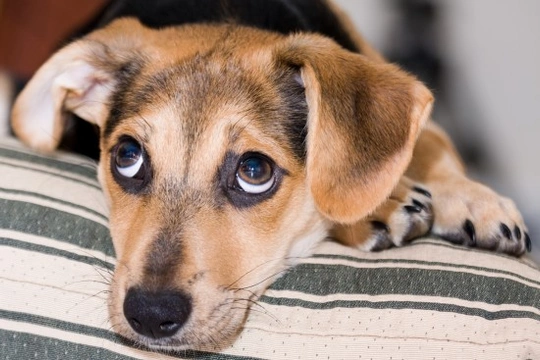
Puppy Crying: Tips for Calming Your New Puppy
When you first bring your new puppy home, everything is going to seem rather strange to them, and they will be well outside of the realm of experience of the world that they have thus far developed. Leaving their dam and littermates can be confusing and scary for the young puppy, and it is understandable that losing their canine family, plus the change in their living situation and routine, will lead to a little upset. Added to this, the young puppy will have learned throughout their time with the dam that crying is how they can signal unhappiness or worry, and get their needs met, such as feeding and toileting.
Crying is a form of canine communication much like any other, and it is the first form of communication that the puppy learns, and so often, the first one that they will use to get attention or to try to get their needs met.
However, once your puppy has come home with you, it is important to get them settled in, into a routine, and start training them to settle down and how and when to communicate appropriately. This means that crying needs to be curbed, and there is a fine and very blurry line between leaving your puppy crying unhappily and ignoring them, and pandering to their demands and teaching them that crying means attention!
Read on to learn more about dealing with puppy crying, when to intervene, and when to leave them alone.
Responses to puppy crying
How and when you respond to your puppy’s cries will teach your puppy about when it is appropriate to cry and when not to, and what they can come to expect from doing so.
First of all, it is important to ensure that you always respond if your puppy is crying for a valid reason, such as needing water, or to go to the toilet. Never ignore a puppy that is crying to get their basic needs met, or training will become more difficult later on.
When you first begin to leave your puppy alone for more than a few minutes, or begin to teach them to sleep alone at night, these can be trigger points for puppy crying, both for attention and because they might be scared to be on their own. The automatic and very hard to resist response to this for most people is to soothe the puppy and stop their tears, but this can set up a vicious cycle of crying for attention, receiving attention, being left alone and crying again. Make sure that your puppy has everything that they need, and that they are not uncomfortable- ensure that they are warm enough, have a safe place to stay in, have toys to entertain them and that you have not forgotten everything, so that you don’t have to worry that your puppy is crying because they need something.
Also, you should get your puppy used to being left alone gradually, building up from a few minutes at a time. It is not appropriate to suddenly leave a puppy alone for the first time for several hours, and simply allow them to cry themselves out until they are exhausted.
How long to leave a puppy crying for
If you are positive that your puppy has everything they need and is comfortable, and that you are not simply trying to leave them alone for too long too soon, the next question to consider is how long you should leave a puppy crying for before you will need to intervene.
Do not jump up to check on your puppy if they are crying for just a minute or two; they may be trying their luck, or concentrating on crying rather than seeing that everything is in fact alright and that they can calm down and relax! Not only does this mean that you should not get up and pander to your puppy within a few minutes, but don’t be tempted to call out to them either, or make any deliberate sounds to reassure them. Leave them to get on with it, as every interaction you have with them within this timeframe will delay them finally settling down.
If your puppy is still crying non-stop after 15 minutes to half an hour, however, you might need to check on them, as this is the timeframe within which it is reasonable to expect the puppy to tire themselves out and eventually settle.
Check on your puppy in this case to ensure that they do not need to go to the toilet and are not hurt, but do not hang around and pander to your puppy’s desire for attention. Settle them back down and leave them promptly, and ignore their crying if they start up again as soon as you have left.
Crying at night
Nighttimes and bed times are the most common times when you can expect a new puppy to cry, as they will be left alone for a protracted period of time, plus the house will be dark and silent.
Try to allow your puppy to sleep within earshot of you so that they will be able to hear that they are not totally alone, and consider leaving a nightlight on for them, and possibly a radio turned down low so that the house is not completely silent.
It is important to get your puppy used to the idea of sleeping through the night, but bear in mind that younger puppies might not be able to go for a full eight hours without needing the toilet. If your puppy settles and sleeps but whines in the middle of the night, check on them to ensure that they do not need the loo!



